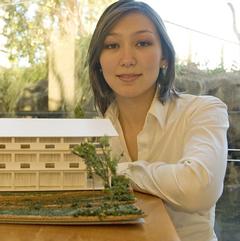Sonya RedmanAUSTRALIA’S CHALLENGING SOCIAL ISSUE - unsustainable housing Glenn Murcutt’s houses that “touch the earth lightly” are widely acclaimed on the world stage. They possess tranquil simplicity and tactile elegance; they never fail to engage the surrounding natural environment with harmony. Yet, Australia’s housing reality is starkly different. ‘McMansions’ are large houses on small plots that plague the Australian suburban landscape - illustrating the antithesis of Murcutt’s environmental and spatial architectural symphony. The architecturally untouched suburban milieu fails to accommodate environmental, social and economically sustainable principles. There are 7 million dwellings in Australia. Over the next 50 years there is a potential increase of 5 million. This alarming demand requires land that simply does not exist on the limited habitable coastal fringes of this vast but arid continent. If the present design ethos continues those who will suffer most are in the lowest socio economic demographic. The government’s gradual defunding of public housing and mental health institutions over the last 30 years has led to a steady ‘ghettoisation’ of people suffering from mental illnesses, disabilities and drug addiction. Low income families from indigenous and migrant cultural backgrounds are also disproportionally affected. With an exponential population increase, the poor will be further forced into overcrowded and under funded high density public housing or to the remote fringes without access to transport, education, social networking or health facilities. In this way, the physical marginalisation symbolises a social marginalisation – causing a systemic and perpetual cycle of poverty. CULTURAL AND HEALTH SPECIFIC PUBLIC HOUSING To initiate positive change, new paradigms for urban living are paramount to the sustainable health of Australia’s communities. The former NSW Premier’s policy of all three storey apartment buildings to be designed by a registered architect was a boon for the urban fabric and our city’s movement towards sustainability. But these requirements did not extend to the public sector There are few examples of socially conscious housing developments for the public sector. No public sector dwellings attempt to address the specific needs of marginalised community members, especially those with cultural or health requirements. My submission therefore proposes to design culturally sensitive and health benefiting housing for low socio economic demographics by focussing on architectural articulation that enables environmental responsibility and social equality. THE PROPOSAL 1. Research demographic needs through interviews and surveys of target groups. 2. Research local environmental initiatives and material accessibility. 3. Plan diagram of needs uncovered, and develop corresponding architectural relationships outside of the traditional colonial paradigm. 4. Esquisse exploring form that can accommodate researched spatial relationships and environmental sustainable principles. 5. Design exploration of Murcutt inspired 'lightness of form' that simultaneously articulates response to cultural and social sensitivities. 6. Design presentation to interviewed groups – input and feedback. 7. Final design proposal. The design proposal will directly challenge Australia’s historical and cultural Eurocentric precedents that cloud the nation’s architectural collective conscious. The role of Australian architects and students who possess inherent qualities of empathy and responsiveness is to fulfil the specific needs of our diverse and troubled public sector housing inhabitants by facilitating empowerment and equality through the provision of socially sustainable architecture. Additional Help and InformationAre you in need of assistance? Please email info@berkeleyprize.org. |
|

